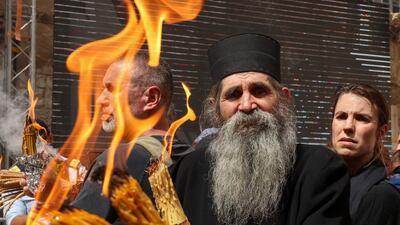Christian leaders in Jerusalem have publicly rejected "unreasonable" and "heavy-handed" Israeli police controls for Saturday's Holy Fire ceremony, the most important annual event for Christians in the Holy Land.
The city's biggest churches have called on all Christians to attend, in direct opposition to police measures that severely limit the number of worshippers at the event.
The nearly 2,000-year-old ceremony is the most important event for Orthodox and Eastern churches in the Holy Land.
According to the Greek Orthodox Patriarchate, this year's restrictions include the stationing of 200 police inside the church, security checkpoints throughout the Old City and limiting access to the Holy Sepulchre to fewer than 2,000 people, significantly down from about 10,000 in previous years.
For the first time, Armenians and Catholics endorsed the Greek Orthodox communique on the Holy Fire ceremony.
Near the Church of the Holy Sepulchre, Father Mattheous Siopis of the Greek Orthodox Patriarchate in Jerusalem said: "This year, after many attempts made in goodwill, we are not able to co-ordinate with the Israeli authorities, as they are enforcing unreasonable restrictions on access to the Holy Sepulchre."
After his invitation for all Christians to attend, Mr Siopis said "we leave the authorities to act as they will".
"The churches will freely worship, and do so in peace," he added.
The Church of the Holy Sepulchre is Christianity's most sacred site. It contains a tomb in which Jesus Christ is believed to have been interred after his crucifixion.
Last year, Israeli police erected barriers throughout the Old City, which Mr Siopis said "made it impossible for our local Christian communities and pilgrims to attend the Holy Light ceremony".
The ceremony revolves around what Christians believe to be the miraculous lighting of "Holy Fire" inside Jesus's tomb.

The news comes amid mounting anger among Israel and Palestine's Christian population over what they view as arbitrary Israeli restrictions on the ceremony designed to impede worship, restrict the area's Christian identity and create a hostile environment for worshippers.
Israeli authorities say the measures are to ensure security during an event in which thousands of worshippers descend on Jerusalem's Old City.
In a statement, police said "limiting the number of participants is not a result of a police initiative but a necessary safety requirement, according to the professional analysis of the safety engineer on behalf of the churches".
"The Israel Police will act to safeguard human life and fulfil the instructions of the safety engineer even during the Holy Fire ceremony, and expects church leaders and organisers to do the same."
But the Patriarchate responded: “Engineer Teo had no authority to produce such a report. He was not requested to do so by the officials of the Holy Sepulchre or of the Churches."
Gaza permits
Earlier this week, the Saint Porphyrios Orthodox Church said Israel cancelled permits allowing Christians in Gaza to leave the strip for Orthodox Easter.
Residents of Gaza require a permit from Israeli authorities to leave the area, which has been under Israeli and Egyptian blockade since 2007.
About 1,000 Christians live in Gaza, most of whom are Greek Orthodox.
In recent years, Christian leaders have repeatedly sounded the alarm over the community's security and future, referring to an increase in the number of attacks against Christians, vandalism of holy sites and settlement activity as major threats.
In September, Jordan's King Abdullah II said Jerusalem's Christians were “under fire”.
“The rights of churches in Jerusalem are threatened. This cannot continue. Christianity is vital to the past and present of our region and the Holy Land. It must remain an integral part of our future,” he added.

In March, two Israeli men attacked the Tomb of the Virgin Mary in the Church of Gethsemane in Jerusalem, threatening an archbishop who was leading a service at the time.
In February, a US citizen was arrested after breaking a statue of Jesus at the Church of the Flagellation.
In January, Israeli settlers paraded through the Armenian quarter of the Old City, assaulting Christian tourists and writing “Death to Christians” on the walls of a monastery.
Two teenagers were arrested in January for allegedly vandalising more than two dozen Christian graves on Mount Zion. To date, there have been no legal proceedings against the accused.


